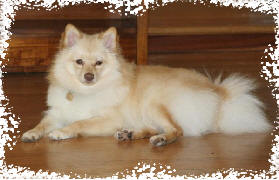
Why Choose a
German Spitz?
Click here for the German
Spitz Standard
The magnificent coat and cheeky foxy face certainly attract many people to
their first German Spitz as either show or companion animal. I chose my
first one in 1994 using high intelligence and loyalty as the main criteria.
One look at the face of my Spitz was enough to convince anyone that here was
a smart dog with a huge personality. He proved to be incredibly loyal,
loving and trainable. The added advantage was that all this came in a
compact package with a long lifespan.
Grooming
Despite the coat, German Spitz, are not high maintenance dogs. Regular
brushing is essential to remove old coat and stimulate new growth but
without a typically doggy odour there is no need to bath the dog as often as
people might think. Mud brushes out after it dries and the coarse coat
repels water. Extra brushing is required at the end of summer and winter to
remove the old coat and avoid tangles and knots. Grass seeds and burrs can
be a problem, as in any coated breed, but many rural people own German Spitz
and find grass seeds brush out easily. Particular attention must be paid to
ensuring the hair inside the ears is kept free from seeds and burrs.
Training and Exercise.
All dogs need sufficient exercise and the opportunity to adequately
socialise with other dogs and people. German Spitz do require exercise to
keep them fit and healthy but a brisk daily walk will suffice for this and
they can live successfully in apartments provided a daily walk is part of
their routine. They respond well to positive training and an early emphasis
on training and socialisation will ensure many years of loyal and fun filled
companionship.
Personality.
German Spitz are highly people oriented and quickly form a strong bond with
the family. If puppies are brought up with children who are educated in
caring appropriately for an animal, then they make an ideal pet for the kids
and will join in all the fun and games a family can offer. Obviously, their
compact size means that rough and tumble games are inappropriate. All dogs
bark and these are no exception but can be trained from an early age to
respond appropriately. You can expect your Spitz to welcome visitors with
enthusiasm and then join in any activities you have planned. These are dogs
that thrive on companionship and do not tolerate isolation.
Health and Diet.
German Spitz are quite hardy dogs and so far careful breeding has ensured
that no obvious hereditary problems have developed. Good nutrition is
essential for the coat to achieve its full potential and choosing a well
balanced diet is obviously important for this. Omega 3 and 6 fatty acids
should be a part of the diet, either already included in kibble or added to
home cooking. Being compact dogs it is important not to train them to jump
up excessively as this will stress rear leg joints and knees; it is
preferable for people to go down to the dog’s level.